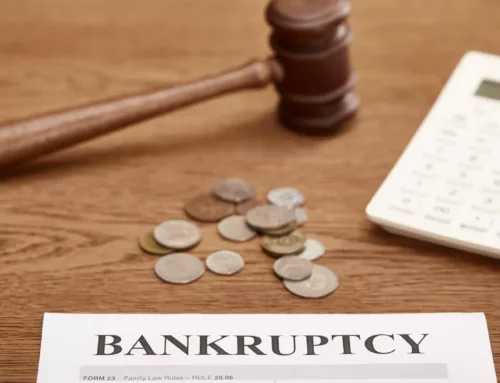Understanding The Ways To Stop Bank Account Garnishment in Bankruptcy in Michigan
A successful strategy to stop bank account garnishment is to file for bankruptcy. Bankruptcy is a legal procedure to ease the load when a person struggles to pay their debts and is unable to meet their responsibilities. One of the immediate advantages of declaring bankruptcy is the automatic stay, a potent weapon that prevents creditors from beginning collection proceedings, such as bank account garnishment. But did you know there are ways to stop bank account garnishment in bankruptcy?
The automatic stay kicks in after the bankruptcy petition is filed, protecting the debtor’s assets from further seizure for a limited period of time. This gives the debtor back control over their bank account and stops creditors from taking out more money. People can take proactive action to stop bank account garnishment and get a fresh start on their path to financial stability by starting bankruptcy proceedings.
Here are ways to stop bank account garnishment in bankruptcy:
- Filing bankruptcy
- Request for Exemption
- Negotiation with creditors
- Preventing New Levies
To stop bank account garnishment in bankruptcy, bankruptcy attorneys are essential. Hammerschmidt Stickradt & Associates are knowledgeable and reliable Michigan bankruptcy attorneys who can help those having trouble with their bank account garnishment. We help people with their financial needs with passionate, genuine care. Reach out to Michigan bankruptcy attorneys to know your options.
Filing Bankruptcy
Bank account garnishment might be stopped with the help of a bankruptcy filing. When a judgment against a debtor and a court order for wage garnishment is obtained, creditors may also try to seize money from the debtor’s bank accounts. However, a person can start an automatic stay by declaring bankruptcy, halting all collection efforts, including bank account garnishment.
A person may apply for bankruptcy under any of its various chapters, including Chapter 7 and Chapter 13.
Chapter 7
People can activate an automatic stay, which immediately stops all collection efforts, including bank account garnishment, by filing for Chapter 7 bankruptcy. Removing the requirement to repay qualifying debts and permanently ending any current bank account garnishments gives people a chance for a fresh start. It enables them to regain their financial stability free from the pressure of collection efforts.
Chapter 13
Individuals can enact an automatic stay by filing for Chapter 13 bankruptcy, which can immediately halt all collection efforts, including bank account garnishment. Under Chapter 13, people design a repayment schedule over a three- to five-year period to make up for missed payments, while the automatic stay safeguards their assets and stops additional asset garnishment. Through this organized repayment plan, borrowers can reclaim control over their bank accounts and progress toward settling their debts systematically and reasonably.
Understanding your jurisdiction’s particular laws and rules requires speaking with a skilled Michigan bankruptcy attorney. They can assist you in navigating the process, deciding which bankruptcy chapter is best for your circumstances, and ensuring that your rights are upheld at all times.
Request for Exemption
A person subject to a bank account garnishment may seek the court in writing for an exemption from the garnishment order. This request often entails producing proof and justifications to show that the money in the account is exempt from garnishment in accordance with local, state, or federal legislation.
Social Security payouts, specific forms of public assistance, retirement accounts, and other protected monies can all be immune from this rule. People may have a chance to stop the bank account garnishment and keep their exempt funds by submitting a well-supported and convincing Request for Exemption, offering much-needed respite from financial hardship.
Through a Request for Exemption, Michigan bankruptcy lawyers can be beneficial in stopping bank account garnishment for people. The lawyer will examine the client’s financial status, determine whether the client qualifies for any exemptions, and gather the evidence required to support the request for exemption.
Negotiation with creditors
One option to consider is negotiating with creditors to stop or reduce the garnishment. Individuals can indicate their intent to meet their financial obligations while looking for a more manageable repayment arrangement by communicating openly and honestly with creditors.
A genuine commitment to paying off the debt, proof of financial difficulty, and a changed payment plan are all possible during negotiations with creditors. By investigating this choice, individuals may reach a win-win agreement that will shield their bank accounts from additional garnishment and give them back control over their money.
Here are some common steps in negotiating:
- Kow the state of your finances
- Investigate your legal choices and rights.
- Speak with the creditor
- Assemble supporting evidence
- Explain the circumstances.
- Offer a fresh repayment strategy
- Negotiate a deal and do it
- Get a written contract.
- Keep your commitments
Michigan bankruptcy attorneys can attempt to negotiate a settlement that lowers the debt balance, creates a repayment schedule, or even stops wage garnishment entirely. Their knowledge of bankruptcy law and encounters with creditors enable them to understand the complexity of the law and fight for their client’s rights, ultimately assisting in preventing more bank account garnishments.
Preventing New Levies
Unlike a wage garnishment, a bank levy ends once it is paid. The charge only applies to the money in the account when the bank receives notice of it. However, a judgment creditor could continue to levy the bank. As a result, until the loan is paid off, keep money out of bank accounts.
Suppose you follow the advice in this post. In that case, certain types of income, such as Social Security, Supplemental Security Income, Veterans Affairs, and others, are shielded from most of your creditors. You should act quickly to fix the debt because the bank account levy is a reliable sign that your earnings may soon be withheld.
The lawyer will assist their clients through bankruptcy and ensure all required paperwork is submitted appropriately and on time. Additionally, they will speak with creditors and the court on their customers’ behalf, thereby stopping further levies on bank accounts.
Learn More About Ways To Stop Bank Account Garnishment In Bankruptcy With Our MI Attorney
Filing for bankruptcy may be an effective solution for those whose bank accounts are garnished. An automatic stay, which stops creditor activities like bank account garnishments, can be obtained by starting the bankruptcy process. This legal safeguard gives debtors the much-needed breathing room they need to retake control of their money and move toward a new financial beginning.
Hammerschmidt Stickradt & Associates are knowledgeable and trusted bankruptcy attorneys who can provide options to mitigate bank account garnishment. It’s crucial to remember that bankruptcy should only be used as a last resort, and people should speak with a skilled Michigan bankruptcy lawyer to evaluate their particular situation and examine other choices before making a choice.
Individuals can overcome the difficulties of bank account garnishment and pave the way to a better financial future by being proactive and getting legal advice from our trusted attorneys. Reach out to us and schedule a free consultation now!



